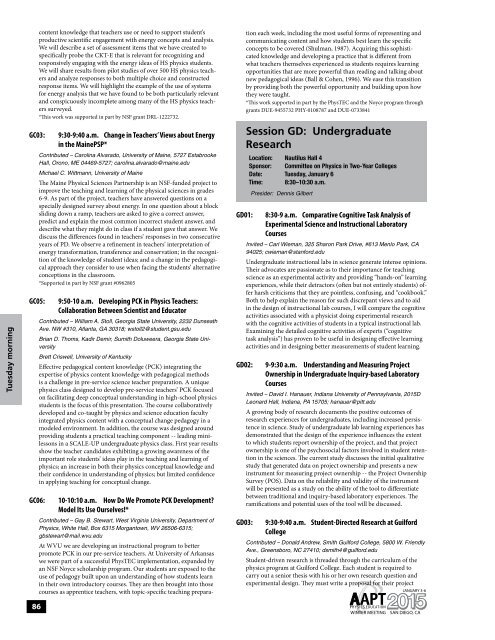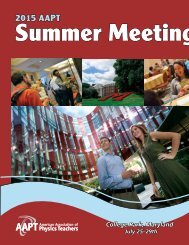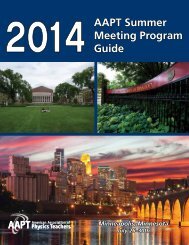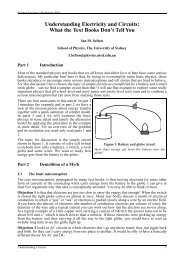final-program-12-23-14-3
final-program-12-23-14-3
final-program-12-23-14-3
Create successful ePaper yourself
Turn your PDF publications into a flip-book with our unique Google optimized e-Paper software.
Tuesday morning<br />
GC03:<br />
86<br />
content knowledge that teachers use or need to support student’s<br />
productive scientific engagement with energy concepts and analysis.<br />
We will describe a set of assessment items that we have created to<br />
specifically probe the CKT-E that is relevant for recognizing and<br />
responsively engaging with the energy ideas of HS physics students.<br />
We will share results from pilot studies of over 500 HS physics teachers<br />
and analyze responses to both multiple choice and constructed<br />
response items. We will highlight the example of the use of systems<br />
for energy analysis that we have found to be both particularly relevant<br />
and conspicuously incomplete among many of the HS physics teachers<br />
surveyed.<br />
*This work was supported in part by NSF grant DRL-<strong>12</strong>22732.<br />
9:30-9:40 a.m. Change in Teachers’ Views about Energy<br />
in the MainePSP*<br />
Contributed – Carolina Alvarado, University of Maine, 5727 Estabrooke<br />
Hall, Orono, ME 04469-5727; carolina.alvarado@maine.edu<br />
Michael C. Wittmann, University of Maine<br />
The Maine Physical Sciences Partnership is an NSF-funded project to<br />
improve the teaching and learning of the physical sciences in grades<br />
6-9. As part of the project, teachers have answered questions on a<br />
specially designed survey about energy. In one question about a block<br />
sliding down a ramp, teachers are asked to give a correct answer,<br />
predict and explain the most common incorrect student answer, and<br />
describe what they might do in class if a student gave that answer. We<br />
discuss the differences found in teachers’ responses in two consecutive<br />
years of PD. We observe a refinement in teachers’ interpretation of<br />
energy transformation, transference and conservation; in the recognition<br />
of the knowledge of student ideas; and a change in the pedagogical<br />
approach they consider to use when facing the students’ alternative<br />
conceptions in the classroom.<br />
*Supported in part by NSF grant #0962805<br />
GC05: 9:50-10 a.m. Developing PCK in Physics Teachers:<br />
Collaboration Between Scientist and Educator<br />
Contributed – William A. Stoll, Georgia State University, 2<strong>23</strong>2 Dunseath<br />
Ave. NW #310, Atlanta, GA 30318; wstoll2@student.gsu.edu<br />
Brian D. Thoms, Kadir Demir, Sumith Doluweera, Georgia State University<br />
Brett Criswell, University of Kentucky<br />
Effective pedagogical content knowledge (PCK) integrating the<br />
expertise of physics content knowledge with pedagogical methods<br />
is a challenge in pre-service science teacher preparation. A unique<br />
physics class designed to develop pre-service teachers’ PCK focused<br />
on facilitating deep conceptual understanding in high-school physics<br />
students is the focus of this presentation. The course collaboratively<br />
developed and co-taught by physics and science education faculty<br />
integrated physics content with a conceptual change pedagogy in a<br />
modeled environment. In addition, the course was designed around<br />
providing students a practical teaching component -- leading minilessons<br />
in a SCALE-UP undergraduate physics class. First year results<br />
show the teacher candidates exhibiting a growing awareness of the<br />
important role students’ ideas play in the teaching and learning of<br />
physics; an increase in both their physics conceptual knowledge and<br />
their confidence in understanding of physics; but limited confidence<br />
in applying teaching for conceptual change.<br />
GC06: 10-10:10 a.m. How Do We Promote PCK Development<br />
Model Its Use Ourselves!*<br />
Contributed – Gay B. Stewart, West Virginia University, Department of<br />
Physics, White Hall, Box 6315 Morgantown, WV 26506-6315;<br />
gbstewart@mail.wvu.edu<br />
At WVU we are developing an instructional <strong>program</strong> to better<br />
promote PCK in our pre-service teachers. At University of Arkansas<br />
we were part of a successful PhysTEC implementation, expanded by<br />
an NSF Noyce scholarship <strong>program</strong>. Our students are exposed to the<br />
use of pedagogy built upon an understanding of how students learn<br />
in their own introductory courses. They are then brought into those<br />
courses as apprentice teachers, with topic-specific teaching preparation<br />
each week, including the most useful forms of representing and<br />
communicating content and how students best learn the specific<br />
concepts to be covered (Shulman, 1987). Acquiring this sophisticated<br />
knowledge and developing a practice that is different from<br />
what teachers themselves experienced as students requires learning<br />
opportunities that are more powerful than reading and talking about<br />
new pedagogical ideas (Ball & Cohen, 1996). We ease this transition<br />
by providing both the powerful opportunity and building upon how<br />
they were taught.<br />
*This work supported in part by the PhysTEC and the Noyce <strong>program</strong> through<br />
grants DUE-9455732 PHY-0108787 and DUE-0733841<br />
Session GD: Undergraduate<br />
Research<br />
GD01:<br />
Location: Nautilus Hall 4<br />
Sponsor: Committee on Physics in Two-Year Colleges<br />
Date: Tuesday, January 6<br />
Time: 8:30–10:30 a.m.<br />
Presider: Dennis Gilbert<br />
8:30-9 a.m. Comparative Cognitive Task Analysis of<br />
Experimental Science and Instructional Laboratory<br />
Courses<br />
Invited – Carl Wieman, 325 Sharon Park Drive, #613 Menlo Park, CA<br />
94025; cwieman@stanford.edu<br />
Undergraduate instructional labs in science generate intense opinions.<br />
Their advocates are passionate as to their importance for teaching<br />
science as an experimental activity and providing “hands-on” learning<br />
experiences, while their detractors (often but not entirely students) offer<br />
harsh criticisms that they are pointless, confusing, and “cookbook.”<br />
Both to help explain the reason for such discrepant views and to aid<br />
in the design of instructional lab courses, I will compare the cognitive<br />
activities associated with a physicist doing experimental research<br />
with the cognitive activities of students in a typical instructional lab.<br />
Examining the detailed cognitive activities of experts (“cognitive<br />
task analysis”) has proven to be useful in designing effective learning<br />
activities and in designing better measurements of student learning.<br />
GD02: 9-9:30 a.m. Understanding and Measuring Project<br />
Ownership in Undergraduate Inquiry-based Laboratory<br />
Courses<br />
Invited – David I. Hanauer, Indiana University of Pennsylvania, 2015D<br />
Leonard Hall, Indiana, PA 15705; hanauer@pitt.edu<br />
A growing body of research documents the positive outcomes of<br />
research experiences for undergraduates, including increased persistence<br />
in science. Study of undergraduate lab learning experiences has<br />
demonstrated that the design of the experience influences the extent<br />
to which students report ownership of the project, and that project<br />
ownership is one of the psychosocial factors involved in student retention<br />
in the sciences. The current study discusses the initial qualitative<br />
study that generated data on project ownership and presents a new<br />
instrument for measuring project ownership -- the Project Ownership<br />
Survey (POS). Data on the reliability and validity of the instrument<br />
will be presented as a study on the ability of the tool to differentiate<br />
between traditional and inquiry-based laboratory experiences. The<br />
ramifications and potential uses of the tool will be discussed.<br />
GD03:<br />
9:30-9:40 a.m. Student-Directed Research at Guilford<br />
College<br />
Contributed – Donald Andrew, Smith Guilford College, 5800 W. Friendly<br />
Ave., Greensboro, NC 27410; dsmith4@guilford.edu<br />
Student-driven research is threaded through the curriculum of the<br />
physics <strong>program</strong> at Guilford College. Each student is required to<br />
carry out a senior thesis with his or her own research question and<br />
experimental design. They must write a proposal for their project<br />
WINTER MEETING<br />
JANUARY 3-6<br />
2015<br />
SAN DIEGO, CA






